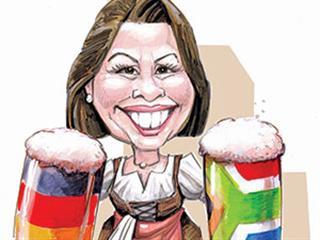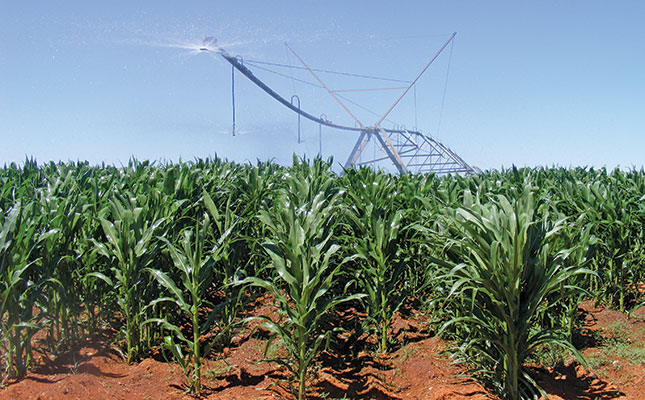
"Hope, confidence and new beginnings – these fundamental concepts have shaped my perceptions of South Africa ever since Nelson Mandela and FW de Klerk were jointly awarded the Nobel Peace Prize for their reconciliation work 20 years ago. These concepts continue to shape my perceptions of SA today – largely due to the potential within agriculture.
Agriculture and rural areas are crucial sectors for poverty eradication, food security and stability. For a long time, agriculture was neglected in development co-operation and in the developing countries themselves. But policymakers and business leaders are now starting to focus renewed attention on agriculture and rural areas. I sincerely welcome this new approach, particularly given the global challenges we all face.
By the year 2050, the world’s population will have reached 9 billion. According to estimates by the Food and Agriculture Organisation of the UN (FAO), we will then require two-thirds more food than we currently produce. Consumer behaviour is also changing with demand for high quality foodstuffs rising at explosive rates, particularly in emerging countries.
At the same time, climate change and related natural disasters are causing major yield losses more frequently than before – particularly in Africa. Finally, food prices on world markets have become increasingly volatile in the wake of economic and financial crises, often with dramatic consequences for African countries. We have long known that water and farmable land are limited, whereas the number of people needing to be fed is steadily growing.
In some parts of the world, conflict over these scarce resources is already tangible. This makes the need for sustainable agriculture more pressing than ever. Only if agriculture is geared towards sustainable production can we succeed in overcoming hunger and poverty in the long term. My message is clear: Food production must always take precedence over the production of goods for other purposes such as energy generation or industrial usage.
Four pillars
There are four pillars essential to support sustainable agriculture:
- Farmers require stable and dependable conditions for planning. If you’re unsure whether you’ll still own the land when it comes to harvesting and marketing the produce, you’ll let the fields lie fallow and pursue other activities. But due to the aforementioned challenges, this is precisely what we can’t afford. What we need is legal certainty so that farmers will invest in their own operations. This includes the recognition and protection of the local population’s existing water and land tenure rights. Without unassailable rights to land, farmers cannot provide any collateral for credit. These rights are particularly important for women who make up 70% of smallholders in Africa and often bear the main responsibility for securing the food supply. Prudent land reform is a key factor here, even if it often takes longer than expected. This is something we encountered in eastern Germany following our country’s reunification. The difficulties that arose during that period taught us a great deal. Today we know that land reforms are most likely to succeed if they avoid unsettling the people who work in the agriculture sector, if they create legal peace between all the stakeholders and if they safeguard food production over the long term. We want to pass on our experiences from this post-reunification period. For example, the Land Utilisation and Management Company, which is tasked with implementing land reform in eastern Germany, would be glad to share its knowledge with authorities in charge of land reform issues.
- Responsible investments are crucial for food security and rural development. I made this the main topic of the Global Forum for Food and Agriculture in January. Around 80 agriculture ministers signed a ground-breaking international declaration on responsible investments in agriculture, giving us a solid basis for the work ahead.
- It is essential to provide farmers with good education. In Germany, we have had decades of excellent results with our ‘dual training system’. Here, we combine theoretical course work in vocational schools with hands-on experience in the workplace. The next generation of farmers is thus equipped with high levels of skill and motivation. Clearly it is not possible to transfer every aspect of our dual training system to other countries. But in my conversations with African colleagues, the desire for sound vocational training in the agricultural sector is often voiced. We would be happy to share our positive experiences in the field of agricultural training. This is why I hope to sign a joint ‘declaration of intent on basic and advanced vocational training’ with my SA counterpart during my visit. This declaration could include the posting of a German specialist in the training of skilled agricultural employees to SA’s department of agriculture. This specialist could be largely funded by my ministry’s budget and be able to share his/her expertise on location.
- I advocate giving an active role to farmers’ associations – they are the true mouthpiece of the farmers. These independent professional organisations enable the pooling of interests, thus strengthening the position of farmers in negotiations with buyers, investors and government authorities.
This is why I support the seminar by the German Farmers’ Union that is being held for African farmers’ associations. The seminar will address the question of how associations can be strengthened. It will be an important building block for encouraging regular exchange between farmers in Africa and Germany. Beyond that, independent agricultural self-help organisations such as producer groups, co-operatives and machinery pools are an excellent basis for achieving sustainable productivity increases in agriculture.
Machinery pools, in particular, embody the true spirit and value of community action by providing farms with emergency help (eg, at harvest) or enabling the use of modern equipment that would be unaffordable for individual farmers. These pools are an expression of ubuntu. For me, this idea also includes the sharing and exchange of agricultural products between our two countries.
People in Germany appreciate and enjoy purchasing top quality products from SA – red wine, fresh and citrus fruits. Last year alone, we imported almost 79 million litres of wine into Germany. At the same time, I’m delighted that SA consumers are increasingly developing a taste for German products such as cheese, meat and beer.
It is clear that trade in agricultural products must never be a one-way street but should always enable both trading partners to benefit from each other. Our German-SA trading relations are definitely on the right track and we should continue in this direction. Whether in Germany or SA, agriculture needs to be profitable for farmers and farm workers alike. There is no other way to produce enough food for the world’s growing population while also offering decent prospects to people in rural areas.
But for this to happen, we need stable overall conditions, investment in modern agricultural technology, solid training and strong farmers’ associations. These will be the core themes of my visit.
The views expressed in our weekly opinion piece do not necessarily reflect those of Farmer’s Weekly.













